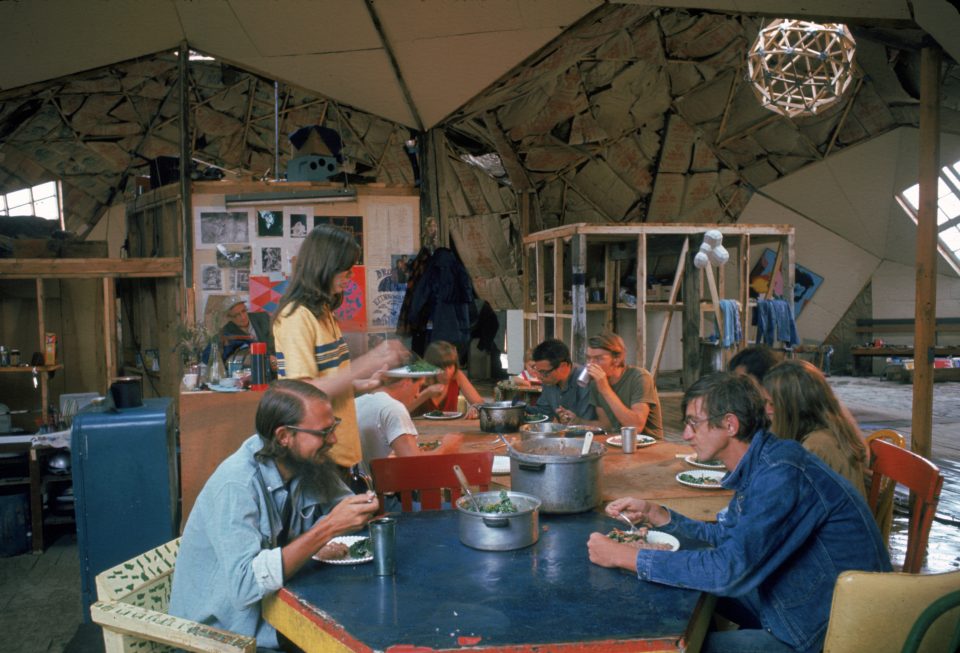- Communal living surged in the 1960s and ‘70s as part of the hippie movement. Today, Gen Z and millennials are increasingly turning to co-buying homes with friends or family—not for countercultural reasons, but as a practical response to high housing prices, student debt, and mortgage rates.
The 1960s and ‘70s were one of the most colorful and plentiful examples of communal living. Younger generations—baby boomers, at the time—developed communes that were welcoming of anyone willing to reject mainstream culture and escape urbanism.
It was also a lower-cost living option. Communes—largely influenced by the hippie movement, a rejection of mainstream culture based on peace, love, freedom, and individualism—pooled resources for rent, food, and utilities, driving costs down, according to a 1970 article by The New York Times. Houses were shared among several people, pushing down rent costs and eliminating the need for separate appliances, utilities, and other living expenses.

Communal living was popular 50 to 60 years ago. Now, we’re witnessing a resurgence of communal living, which has become increasingly common among Gen Z—but for very different reasons.
According to a recent report by the National Mortgage Insurance Corporation, nearly one-third of Gen Zers said they’re open to pooling funds and purchasing a home with friends or family, a practice known as co-buying; 18% of millennials said the same. A 2024 OpenDoor report also said more than three in four first-time homebuyers purchased their house with parents, siblings, friends, romantic partners, and even colleagues.
This isn’t just a would-be trend. Real estate professionals and other housing experts told Fortune they’re already seeing this movement show up in their own housing markets.
TikTok and Instagram are also filled with videos of Gen Z and millennials who have bought homes together.
Communal living across the U.S.
Patti Cooper, a Fairfield County, Conn.-based real-estate agent for Coldwell Banker, told Fortune the co-buying trend is becoming increasingly popular in her housing market since housing prices have skyrocketed since the pandemic. Mortgage rates are still nearly 7%, and Americans need to make six figures to afford a median-priced home, which is currently more than $422,000, according to the National Association of Realtors (NAR).
Parents have sold their homes and combined their income with their children to buy single-family homes with separate in-law apartments, she said. While it can work out nicely, younger generations still want their own space.
“Siblings are also buying houses together because of the rising cost of rents. It’s more affordable,” she added. “The other reason is that student loan debt makes it harder to qualify for a mortgage by yourself.”
Elena Novak, a lead real-estate researcher and analyst at Property Checker based in Massachusetts, also told Fortune more Gen Z and millennial buyers have been “banding together” to buy homes in the past two years.
“At first, it was two siblings or close college friends pooling savings to snag a condo that neither could afford alone,” Novak said. “Now I’m seeing triads of coworkers or even small house shares of four people on the hunt.”
“The uptick is unmistakable compared to just five years ago,” she continued, “when co-buying was essentially nonexistent outside of married couples.”
Another common co-living option for Gen Zers, according to Bar Zakheim, CEO of Better Place Design and Build, is to build accessory dwelling units (ADUs) on their parents properties.
“The math just doesn’t add up, especially where we are in San Diego with some of the highest housing costs in the country,” Zakheim told Fortune. Co-buying or building an ADU “allows them to find a housing solution for themselves at a fraction of the cost of buying a home.”
And while we may not have something exactly like the hippie movement again, we can expect the trend of Gen Z and millennial co-buying to continue, experts say.
“Unlike the counterculture communal living experiments of the 1970s—which blossomed alongside a broader cultural shift and then faded as the economy strengthened—today’s co-buying is rooted in hard economics,” Novak said. Signs like high home prices and mortgage rates “points to co-buying being more than a fleeting experiment. It’s likely to become a permanent, normalized path to ownership.”













